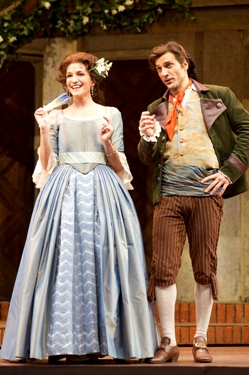I would love one day to see the two great Beaumarchais operas, Rossini’s The Barber of Seville and Mozart’s The Marriage of Figaro, back to back. Perhaps one before dinner, one after; call it a Ringlet Cycle. The first tells the story of the young Count Almaviva’s wooing of Rosina, and Rossini makes him a tenor. In Mozart’s sequel, their marriage is on the rocks thanks to the Count’s wandering eye, and he’s a baritone. (Aside from the Count and one other, smaller role, the two operas could use the same cast of singers for those characters who appear in both.)
One of the talking points for Seattle Opera’s production of Barber, which opened Saturday, January 15, was the inclusion of a rarely sung final aria for the Count, performed by Lawrence Brownlee in the Wednesday/Saturday cast, while Nicholas Phan, the Count in the Sunday/Friday cast, omits it. Its showoffy difficulty is what makes it optional; not many tenors care to tackle it. Though hearing it suddenly illuminated how Rossini’s hero will morph into Mozart’s cad: The ornate vocal line, as artificially clipped and curlicued as a Versailles garden, suggests ancien-regime imperiousness. And the lyrics—”Do not resist me, do not test my anger”–show a new side to a previously sympathetic character.
Brownlee sings this kind of coloratura with a sort of high-wire tension—very effective in moments of passion or drama, but not such a good fit when the scene calls for ease or romantic suavity, as in the Count’s daybreak serenade that opens the opera. (Very few composers were as considerate as Rossini, giving the role a two-and-a-half-hour break between his most demanding solos.) Phan, a more winningly boyish Count, offers high notes that are lovely and focused in isolation, but noticeably less steady when they pop up in any complicated passagework.
The production’s double cast presents two terrific Rosinas, soprano Sarah Coburn and mezzo-soprano Kate Lindsey. The role has always been sung by either vocal range, with minor adjustments made to the music to take advantage of the former’s top notes or the latter’s low ones. These were equally thrilling: Coburn’s like bursts of blue flame, Lindsey’s smoky and seductive. The very first time I heard Lindsey dip below the staff, I knew the game was up. This is a woman who’ll get anything she sets her mind to, with or without any help from Figaro. He’s the schemer who helps the lovers get together over the opposition of her guardian. José Carbó and David Adam Moore share the role; both perform expertly, though Carbó gives Figaro an arrogant edge that made him less fun to spend time with. The only misstep in Peter Kazaras’ nimble staging, but a huge one, was the Act 1 coda; no one in the cast looked good performing the maladroit series of gestures and motions devised to prevent them from just standing and singing, as if Rossini’s stirring music wasn’t trusted to hold our attention.







